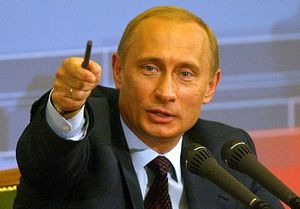Should Russian actions in Crimea have come as a shock? Not here. Sure, the specifics were surprising. But that’s true of any sudden contingency, isn’t it? We all suffer from a prophecy deficit. Indeed, even President Putin may not have planned this venture in advance. He may have simply seen an opportunity coming and seized it. Such events are intrinsically unpredictable.
But scope out to the macro level. Ever since the Cold War, Russians have yearned to restore their standing as a power to be reckoned with. Nor is this impulse likely to subside, either among the political leadership, or the armed forces, or an electorate that covets a return to glory.
The thirst for renown and say-so is more than an “interest,” to use the anodyne term foreign-policy specialists habitually deploy. It’s something elemental. Passion shapes perceptions of interest. It’s a propellant for human actions. Regaining control of Crimea does more for Moscow than guarantee access to the Black Sea. It supplies a token of great power. Flourishing such a token shows that Russia is putting a painful episode — the Soviet Union’s collapse, which Putin famously pronounced a geopolitical catastrophe — behind it.
Thucydides would nod knowingly. The Greek historian lists interests as only one among three prime movers for human actions, the others being fear and honor. Policy specialists, by contrast, prefer to think in terms of quantifiable interests. Doing so implies that we can plug numbers into a cost/benefit formula and foresee what policymakers will do. It also implies that it’s easy to compromise when quarrels arise. Tally up the respective interests, split the difference, and all will be well. Right?
And that’s why Model UN gatherings and similar role-playing exercises customarily solve all the world’s problems in an afternoon. There’s no fervor to such artificial exercises. Having been acculturated to the idea that power politics is wicked and negotiation settles all, students have little invested in some hypothetical dispute except for avoiding conflict. That’s the object to which they attach paramount importance. Ergo, they gladly surrender part of the national interest for the sake of amity. Lions lie down with lambs!!!
Sadly, that’s an outlook at odds with real-world politics, where national leaders fret not just about measurable interests but about burnishing their reputations for diplomatic and military artistry. They try to uphold interests and look good doing it. Domestic constituencies, not the international community, hold them accountable. That — not the approval of ‘furriners, international officials, and other outsiders — is what focuses and concentrates passion among the Putins of this world.
The Naval Diplomat has come to be a firm believer that honor perches atop the hierarchy of Thucydides’ three human motives. (I’d put fear second, for what it’s worth.) Analyzing international interactions, consequently, isn’t just about assessing interests dispassionately. It’s about divining how much value statesmen, soldiers, and ordinary citizens attach to their interests, which in turn determines the price they’re prepared to pay for those interests, which in turn determines how willing they are to compromise. A winner-take-all dynamic may take hold when important constituencies truly prize something. It’s beside the point whether outsiders rate the stakes as small.
In any event, the strategic arithmetic in Crimea lopsidedly favored Moscow’s actions. Russians attach inordinate value to the peninsula and thus, in Clausewitzian terms, might have been prepared to expend significant resources on its behalf for a significant interval of time. But they didn’t need to. Both the magnitude and duration of the effort were slight. Occupying and annexing the peninsula, then, yielded a handsome return on a minor investment.
Unless defenders of the European and international order do things that drive up the costs and risks — skewing Moscow’s calculus toward caution — more such adventures may lie in store. And lest anyone think the stakes are trivial for the United States and its allies, a bad precedent has been set. Namely, that a regional order may be amended by force when some strong power deems it worthwhile.
It’s a safe bet other would-be revisionists are monitoring the situation closely to gauge whether anyone will resist in similar contingencies in the future, and with how much vigor. And so will those embroiled in territorial disputes with such powers (including a certain one that rhymes with diner as Rhode Islanders pronounce it). If they anticipate no succor from America or other friends, they may arm themselves for self-help — and act accordingly. Prospects for peaceful coexistence will sag.
Washington needs to summon up some passion of its own for such controversies. One hopes preserving the international system will furnish incentive enough.

































